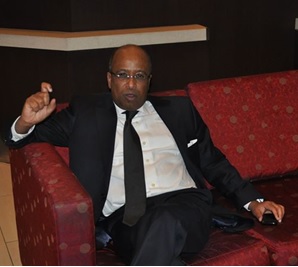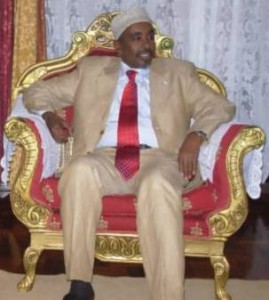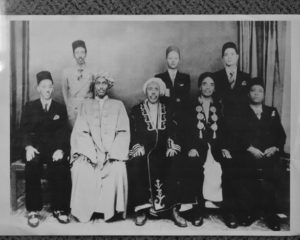Editors Note: Sheiknor Abukar Qassim is a Somali political activist and a prominent figure in the South West political landscape. Born in Mogadishu to a family steeped in Somali history and politics, Sheiknor left Somalia in the mid-eighties to pursue higher education in Italy. He later migrated to Minnesota in the U.S. where he has served as a community activist and co-founder of the Somali Institute of Peace Research (SIPR). He is also a member of the South West Salvation Council and currently the International Investor Relations Representative of the Rochester Medical Technologies, a health organization based in Rochester, Minnesota. Sheiknor spoke with WardheerNews and the following is his responses to some of the issues gripping the South West region of Somalia. The interview was carried out by Hassan Abukar.
——
WDN: Welcome to WardheerNews, first what can you tell us about the political situation in South West (SW) state of Somalia today?
Sheiknor: Thank you so much for the opportunity to share my thoughts with the valuable readers of WardheerNews.The political situation in the South West is precarious for several reasons. The region is suffering from the presence of an administration that lacks transparency, participation in decision-making from the people, and political creativity. Power is in the hands of one man, Sharif Hassan, and the business interest groups that are closely aligned with him that want to maintain the status quo.

Unfortunately, the SW resembles the tragedy of Shakespeare’s King Lear. King Lear, the absolute ruler, acts as though he owns his kingdom and decides to distribute it to his three daughters. Paradoxically, unlike King Lear, Sharif Hassan is neither abdicating nor is he an aging potentate who has descended into madness. Sharif Hassan is in full control of the government machinery. He is street smart, calculating, and conniving. However, he has let his family members run the show, among them his nephew, Mohamed Mursal. Mursal is the state minister for the presidency office and the chief of the election commission.
Both Sharif Hassan and his nephew act like the SW region is family property. Here is a family that controls the regional administration and is engaged in illegal activities such as fraud, extortion, voter suppression, and systematic targeting of rivals. I explained the situation in the SW in a recent interview. Rigged elections have become synonymous with SW politics.
WDN: Why does Al-Shabaab has a strong presence in the South West?
Sheiknor: It is true that al-Shabaab has the strongest presence in the South West, more than in any other region in Somalia. The majority of al-Shabaab foot soldiers hail from the region. It is unfortunate that our children are being used by the terrorist organization for murder and mayhem. They are being captured in regions as far away as Puntland.

Al-Shabaab has found a fertile land in the SW because there is no functioning government in the region that can provide safety and security for its residents. It is typical for militant organizations to thrive in failed states, where there is oppression, injustice, bad governance, and extensive human rights violations. Al-Shabaab militants operate in the SW at whim. They come and go as they please. Sharif Hassan has neither the police force to maintain law and order in the region nor does he have the will power to fight extremism. The Ethiopian forces (Sector 3) in Baydhabo, the capital of the SW, are only there to provide protection for Sharif Hassan. There is an unwritten division of labor between Sharif Hassan and the Al-Shabaab terrorists: He controls Baydhabo and the militants roam and control the hinterland. There are 48 checkpoints in the SW, and the only mode of transportation between Baydhabo and the rest of the country is through air.
WDN: Why does the South West suffer from droughts and famine even though it is the breadbasket of Somalia?
Sheiknor: It is true the SW is rich with natural resources. What happened is that al-Shabaab, which in essence controls the region, has imposed an economic catastrophe on the region. First, they have recruited the young and the children in their ranks. Second, they have prohibited women to farm along with their families. Historically, SW women were in the forefront for being productive in family farming and other business sectors. The militants forced these women to stay home, hence the droughts and famine have increased tremendously in the region. What is left is a husband who can neither count on his children to help him to farm nor his wife, who is basically kept at home. It is shameful that a rich region like the SW has thousands of its people flee from their homes and become internally displaced people (IDP) in other parts of Somalia. This is a cruel breakdown of the economic and social fabric of the region.
WDN: What role does the SW politics play on the national level?
Sheiknor: Once upon a time, the leaders of the SW were the first who advocated for federalism in Somalia. The Xisbiya (HDMS) was a political party for the Digil/Mirifle that fought for the installment of federalism. That was several decades ago and the dominant political party at the time, the Somali Youth League (SYL) was against Xisbiya, which was led by Abdullahi Begedi, Abukar Qassim (my father), Ustaad Osman, and Abdulkhadir Zoope.

It is ironic today that federalism is the very system that is prevailing in the country. Xisbiya leaders were pioneers in the political struggle for making sure the people of the SW could preserve their identities and way of life. The people in the SW have historically been sedentary, stable, and peace loving. Their motto have always been to coexist with other groups through dialogue and power sharing. They were the first who fought against the Italian colonialists and, after independence, were some of the leaders of the independence movement.
Unfortunately, the current administration in the SW has alienated many of the educated sons of the region and stumped their growth. I have talked to SW intellectuals in the diaspora who cannot return to the region because they know they are not welcomed by Sharif Hassan, who sees them as a threat to his tyrannical rule. He prefers officials who lack education and experience.
WDN: What are the ways to save the SW from the brink of disaster?
Sheiknor: Poor leadership is the main problem in the region. This SW region has suffered a lot in terms of lacking visionary, strong leaders. In the beigining, it was the SYL that destroyed the leaders of the region with its cutthroat politics of political domination. It marginalized the Xisbiya to the extent that SW leaders had no choice but to abandon their political party and join the SYL. Moreover, the reigning Somali governments that followed the civilian government used SW leaders as ping pong balls to play one group against the other.
Frankly, Somalia, in essence, has been dominated by two major tribes. It is like the children’s cartoon of Tom and Jerry, with two protagonists chasing each other endlessly. I believe that, first, there must be a reconciliation in the country in general and in the SW in particular. The removal of Sharif Hassan is paramount because this man is a clear and present danger to the national security of the country. He is enabling al-Shabaab, a vicious jihadi terror group, to run the region amok, and he is mismanaging the natural resources of the region through oppression, nepotism, and injustice. If there is no peace in the SW region there is none in the country.
A stable, peaceful South West is an asset for all of Somalia. I call for SW political leaders, elders, women, youth, clerics, and members of the civil society to unite and establish a platform that is based on democracy, power sharing, and reconciliation.
WDN: Thank you so much for your time Sheknor
Sheiknor: Thank you so much for the opportunity.
WardheerNews
We welcome the submission of all articles for possible publication on WardheerNews.com. WardheerNews will only consider articles sent exclusively. Please email your article today . Opinions expressed in this article are those of the author and do not necessarily reflect the views of WardheerNews.
WardheerNew’s tolerance platform is engaging with diversity of opinion, political ideology and self-expression. Tolerance is a necessary ingredient for creativity and civility.Tolerance fuels tenacity and audacity.
WardheerNews waxay tixgelin gaara siinaysaa maqaaladaha sida gaarka ah loogu soo diro ee aan lagu daabicin goobo kale. Maqaalkani wuxuu ka turjumayaa aragtida Qoraaga loomana fasiran karo tan WardheerNews.
Copyright © 2024 WardheerNews, All rights reserved


